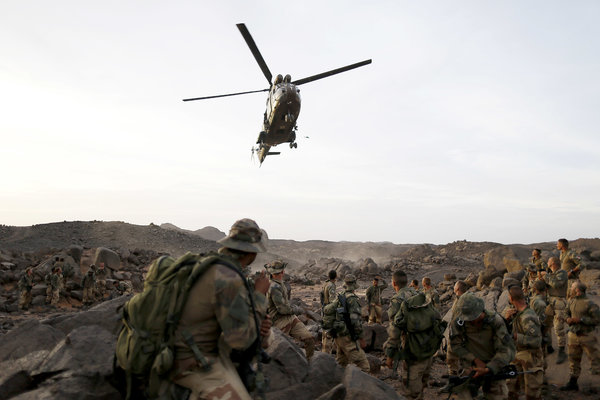And you might find yourself in a beautiful dynamic (Arab Spring), with a beautiful ally (French) ...
And you may ask yourself, How did I get here?

The French did God's work in Mali: cleared out the nutcases who went medieval on the north during their year of ruling dangerously.
But with the "clear" comes responsibility to "hold" (nay, even to "build") and now the locals naturally fear the return of the AQIM-affiliated types who imposed their version of 7th-century morality over the past year or so.
With France planning to start withdrawing its troops from Mali next month, Western and African officials are increasingly concerned that the African soldiers who will be relied on to continue the campaign against militants linked to Al Qaeda there do not have the training or equipment for the job.
The heaviest fighting so far, which has driven the militants out of the towns and cities of northeastern Mali, has been borne by French and Chadian forces, more or less alone. Those forces are now mostly conducting patrols in the north, while troops sent by Mali’s other regional allies, including Nigeria and Senegal, have been slow to arrive and have focused on peacekeeping rather than combat, prompting grumbles from Chad’s president, Idriss Déby Itno.
The outcome of the fighting in Mali carries major implications not only for France, but also for the Obama administration, which is worried that Al Qaeda in the Islamic Maghreb and other militant groups could retain a smaller but enduring haven in remote mountain redoubts in the Malian desert.
To help the French, the United States began flying unarmed surveillance drones over the region last month from a new base in Niger. And the administration has spent more than $550 million over the past four years to help train and equip West African armies to fight militants so that the Pentagon would not have to. But critics contend that the United States seems to have little to show for that effort.
Turning Mali’s own fractured army into a cohesive and effective force would entail “a huge amount of work,” according to Brig. Gen. Francois Lecointre of France, who is leading the effort to retrain Mali’s Army. As if to underscore the point, a group of Malian troops briefly abandoned their posts recently and fired shots in the air to demand a deployment bonus.
Here in the southeastern corner of Mauritania, about 100 miles from the border with Mali, an exercise conducted this month by the United States military to train African armies to foil ambushes, raid militant hide-outs and win over local populations offered the administration more reasons for worry, as well as some encouraging signs.
The exercise offered a rare glimpse into the strengths and weaknesses of several of the African armies that are poised to help take over the mission in Mali. In a few weeks, the United Nations Security Council is expected to decide whether to authorize a peacekeeping force for Mali and how to compose it.
France, we are told, will leave behind a small unit of headhunters - counter-terror personnel. And then there's always America's "limited regret" drones (the gun that's settling the Gap), but we all know that this is temporizing the situation (think back to Ignatius' latest lament on the lack of a SysAdmin-like force). This is why I continue to rail (per my recent piece in Foreign Policy) against retreating to renewed fantasies of great power war as a means of denying the strategic reality still lying out there.
We can most definitely choose to low-ball our responses to such events; we just don't need to blame it on the Chinese, who are - oddly enough - most incentivized to likewise deal with such enduring instabilities.